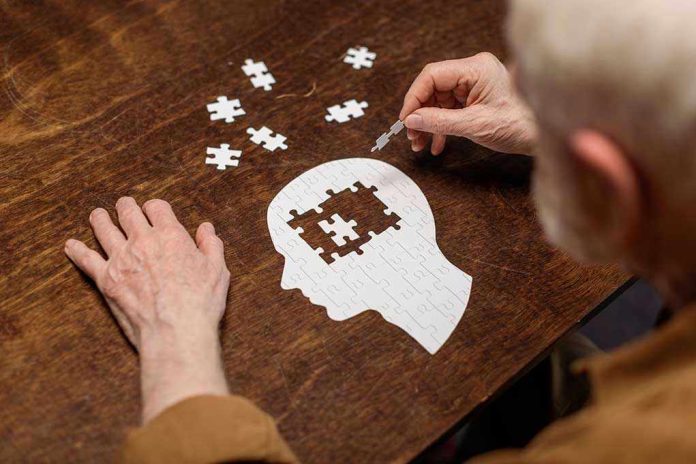
Eight everyday habits could quietly be setting you up for a future where you forget why you walked into rooms, and the science on dementia risk will make you question your next snack and Netflix binge.
At a Glance
- Dementia risk is skyrocketing as the population ages, but many risk factors are within our control.
- Habits like poor diet, lack of exercise, social isolation, and untreated health issues all pile up to raise your risk.
- Women and minorities face greater risks and barriers to care, amplifying the need for awareness and action.
- Early intervention and lifestyle changes can make a real difference, but not all risk is preventable.
Why Dementia Is No Longer Just “Old Age”
Once upon a time, folks shrugged off forgetfulness as “just getting old.” Fast-forward to today, and dementia, especially Alzheimer’s, is a full-blown public health crisis—one that’s growing faster than your collection of mismatched Tupperware lids. Over seven million Americans aged 65 and up already live with Alzheimer’s, and that number is projected to nearly double by 2050. Deaths from Alzheimer’s have more than doubled since 2000, while heart disease deaths fell. Clearly, this is not a trend anyone wants to follow.
Thanks to research, we now know dementia is not an inevitable part of aging. It’s the result of a complicated dance between genes, lifestyle, and time. Cardiovascular health, diet, exercise, sleep habits, and even how much you gab with your friends can all tilt the odds in your favor—or against it. The bottom line: what you do today can change your brain’s story tomorrow.
The Habits That Quietly Raise Dementia Risk
Let’s rip off the Band-Aid—here are eight habits that can stealthily nudge your risk up without you even realizing it:
Poor diet: Forgetting to eat your veggies isn’t just a rebellious act against your childhood. Diets high in processed foods and sugar, low in whole grains and healthy fats, are linked to higher dementia risk. The Mediterranean and MIND diets? They’re not just trendy—they’re proven brain protectors.
Lack of exercise: If your sneakers have more dust than your bookshelf, your brain may be paying the price. Physical activity boosts blood flow, reduces inflammation, and supports memory and thinking skills.
Social isolation: Binging shows alone every night? Loneliness has been shown to increase dementia risk, possibly more than some chronic diseases. Conversation is a brain workout—don’t skip it!
Poor sleep: Chronic sleep deprivation or untreated sleep apnea isn’t just making you cranky; it’s a one-way ticket to cognitive decline.
Untreated health issues: High blood pressure, diabetes, high cholesterol—leave these unchecked and you’re rolling out the red carpet for dementia.
Alcohol use: That “one more glass” can sneak up on you. Excessive drinking in older adulthood has been tied to cognitive decline.
Hearing loss: Ignoring hearing problems leaves your brain working overtime to fill in the blanks, which may accelerate memory loss.
Smoking: Lighting up is a classic way to harm your heart—and your brain pays the price too.
The Unfair Burden: Why Some Groups Are Hit Harder
Women, Black Americans, and Hispanic Americans are more likely to develop dementia, thanks to a tangled web of genetics, social factors, and unequal access to care. These disparities aren’t just numbers—they’re real people with real families, often facing steeper challenges to getting diagnosed and supported. The emotional and financial toll on caregivers is enormous, and as cases multiply, the costs to families and the healthcare system are set to soar.
Caregivers—often unpaid family members—face burnout, stress, and financial strain. The system is already groaning under the weight of rising demand for memory care and support services, and the gap between those who need help and those who get it is only widening.
What You Can Actually Do—And What You Can’t
Here’s the twist: while some risk is hardwired into your DNA, experts agree that what’s good for your heart is good for your brain. Eating a Mediterranean-style diet, exercising regularly, keeping your mind and social life active, treating chronic diseases early, and getting quality sleep all stack the odds in your favor. “Dementia is not inevitable,” says Dr. Victor Henderson of Stanford, “but lifestyle changes can reduce risk—even if they can’t eliminate it.”
Don’t buy into miracle cures. While the Internet is awash with “brain boosters” and questionable supplements, the gold standard for prevention is still common sense. The FDA has approved new medications for Alzheimer’s, but they’re most effective when started early—another reason to stay vigilant about changes in memory and thinking as you age.
Sources:
Alzheimer’s Disease Facts and Figures: Executive Summary 2025
NIH: Risk and Future Burden of Dementia in the United States




